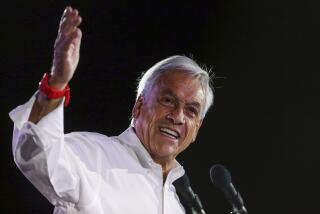Stricken Bolivian President to Resign
- Share via
BUENOS AIRES, Argentina — Bolivian President Hugo Banzer, who is battling lung and liver cancer, will resign from office next month and hand the reins of South America’s poorest nation to Vice President Jorge Quiroga, a government spokesman said Friday.
Banzer, 75, has been undergoing treatment at Walter Reed Army Medical Center in Washington since July 1 but will return to Bolivia next week to hand over power Aug. 6, his country’s independence day. He will then return to Washington to continue treatment, a government spokesman said.
Banzer had been facing calls for his resignation for health reasons after temporarily transferring constitutional powers to Quiroga when the president began treatment in the United States.
The decision means that Banzer, a former dictator who returned to power through the ballot box in 1997, will be cutting short his mandate by one year. He leaves Quiroga, a 41-year-old former IBM executive and Texas A&M; University graduate, at the helm at a time when Bolivia faces massive internal strife from its faltering economy and efforts to combat drug trafficking.
But Banzer, whose election caused much trepidation, accomplished far more during his term than many analysts and U.S. diplomats had expected. After he first came to power in a bloody military coup in 1971, political repression and cocaine trafficking flourished in Bolivia.
When Banzer returned to power, foreign observers initially feared a resumption of political repression. Instead, after being elected by a thin plurality, Banzer took important steps toward human rights and judicial reforms, his supporters say. He also forged a partnership with Washington to forcibly eradicate much of the nation’s crop of coca, the leaf used to make cocaine--an effort that cost him popularity at home.
The widespread eradication of coca has left thousands of Bolivians without livelihoods.
More to Read
Sign up for Essential California
The most important California stories and recommendations in your inbox every morning.
You may occasionally receive promotional content from the Los Angeles Times.













